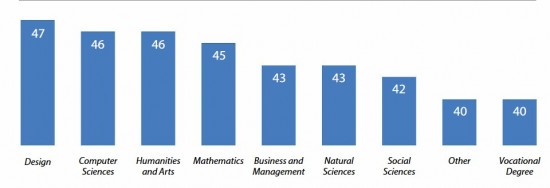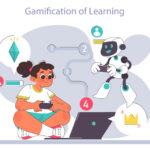April 2, 2016 – What is the 4th Industrial Revolution? How will it impact current and future generations? What kind of formal and informal education will be needed to help humanity adapt to it?
The term 4th Industrial Revolution was bandied about at the recent meeting of the World Economic Forum held in Davos, Switzerland. To what does it refer?
The words “robotics,” “artificial intelligence,” “genomics,” “autonomous vehicles,” “mobile computing,” “smartphone,” “virtual reality,” “Internet of Things,” “3D printing,” “metadata,” “analytics,” “crowdfunding,” “crowdsourcing,” and other disruptive technologies and applications are at the centre of what is conceived to be the 4th Industrial Revolution. Building on the 3rd Industrial Revolution, the data revolution dominated by the arrival of computers, digital networks, the Internet and global telecommunications, the 4th is seen as a convergence of the physical, digital and biological worlds. It is seen as impacting all types of work, all types of industries, and all humanity. Adapting to it is proving to be frightening for many who see their jobs in peril. Adapting to it is seen by others to be empowering, lifting billions from poverty and leveling the global playing field. For some that convergence is leading to a point in time when humanity and the machines it has created will become one, the “Singularity.”
Whether or not the “Singularity” ever occurs, it was clear to those who met at the Davos World Economic Forum with its theme “Mastering the Fourth Industrial Revolution,“ that humanity was entering a new age which Klaus Schwab, founder of the Forum described as one “affecting our lives and reshaping our economic, social, cultural, and human environments. There has never been a time of greater promise, or greater peril.”
Robert Shiller, 2013 Nobel Prize winner in Economics, a participant, commented in terms that sound much like Franklin Delano Roosevelt’s explanation of Lend Lease when he said, “You cannot wait until a house burns down to buy fire insurance on it. We cannot wait until there are massive dislocations in our society to prepare for the Fourth Industrial Revolution.”
In our inventiveness it has led us to the point where humanity must declare a non-shooting war on the future by altering the education paradigm. Only in this way can we ensure this generation and the ones to follow will be able to ride the 4th Industrial Revolution to a successful outcome. Either we will all be endowed with super powers in this new world we are creating or many of us will be left behind to become victims of our own inventiveness.
So how can teaching and education change or does it have to? What is the essence of 21st century learning? Is incorporating all of these technological innovations into the physical classroom the methodology of choice? Is that even possible or affordable?
A recently published report by the Global Schools Leadership Alliance attempts to address these questions. It examines “the career and education realities of young people across nine major economies” and provides insights on how the “21st century classroom” needs to evolve.
The report states the following:
- education is failing to prepare young people for their working future.
- young people need to develop right-brain skills (creativity) just as much as left-brain (mathematics and technical) to adapt to the emerging economy.
- employers need to take charge of training employees, providing full-time rather than part-time positions, and provide them with adaptive skills in the face of disruptive change.
- liquid skills and continuous learning are needed to address future work.
- digital tools need to be embraced by educators and employers to let young people teach themselves anything they need to achieve success.
- Disruptive innovation awareness must be the guiding principle behind education to ensure adaptability to change.
- speed and ubiquity of change must be front of mind in the development of all educational strategies.
Despite the many challenges young people face in terms of job aspirations most remain optimistic. The report polled 72% as feeling, despite “boring and old-fashioned” education, that they still see the classroom as relevant to their future careers. But many educators express concern that no level of formal classroom learning can adequately prepare young people for the “fast-paced, changeable nature of working life.” It is incumbent, therefore, “a commitment to train employees on the job is needed to fill this gap between education and new employment.”
An interesting survey of students working in a variety of disciplines, when asked if education prepared them for what to expect in working life, responded negatively. When asked if they had to learn new skills not taught to them in school, to do their jobs, 73% agreed or agreed strongly. For many disciplines, even those where one would think formal education could more than adequately prepare students for work, the percentages indicating the need to learn new skills ranged from 40 to 47% (see graph below).
States Rick Goings, Chairman and CEO of Tupperware Brands Corporation, “we think training is very important because we believe in general in universities; even graduate school is absolutely too focused on cognitive skills. We will have many young people entering employment and there has been almost no appreciation or development of non-cognitive skills.”
In Part 2 of this series we will look at how classrooms are attempting to adapt to 4th Industrial Revolution and the tools they are using or considering. In Part 3 we will explore the role of business in educating and training present and future employees.


















[…] Disruptive technologies and applications are at the centre of what is the 4th Industrial Revolution, reshaping our education and industries. […]
[…] Technology has played a major role in disrupting the classroom. Len Rosen in his article, Education and the Fourth Industrial Revolution, discussed the Global School Leadership Alliance report that addressed the current and future […]
[…] read talked about how education will change in the next 5 years. Relating this article back to the World Economic Forum, teachers and employers need to take charge of training for the future. Teachers and employers need […]